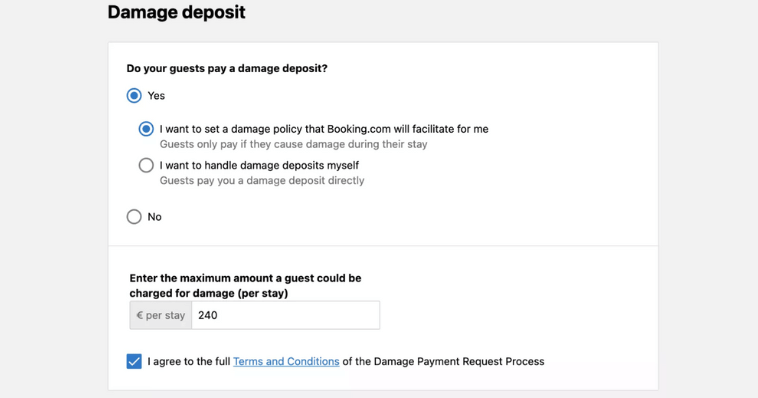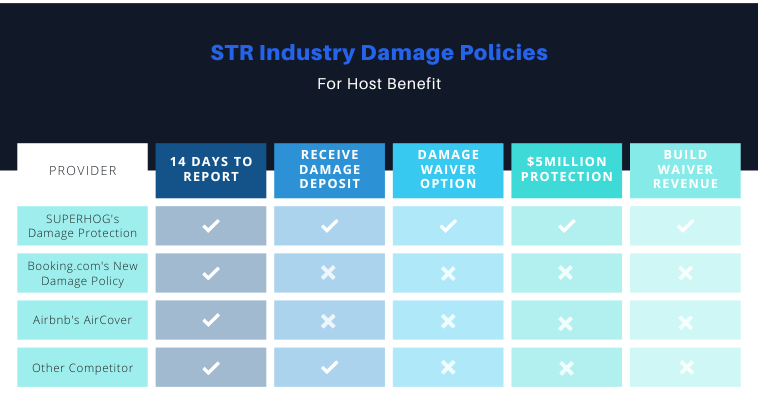When short-term rentals spring to mind, you’re either thinking from a host’s perspective or a guest’s. Popular online distribution sites such as Booking.com and Airbnb act on behalf of both parties: without hosts, there’d be no properties to list, and without guests, there’d be no bookings, per see.
So why, with the latest damage policy additions, are Booking.com and Airbnb alike trying to dissuade hosts from collecting a damage deposit?
It’s true, that for guests, a damage deposit can be somewhat of a concern; however, for hosts and property managers worldwide, they are a growing non-negotiable factor in their risk management strategy.
Follow on for an in-depth comparison between the various damage policies available in the short-term rental industry, what they include, and how you’re impacted as a host.

Hosting a Short-Term Rental
Damage to properties can happen from time to time, sometimes it’s not through malicious intent, accidents can and do happen. It’s how you manage and deal with the risks that come into play that can set you on the right track in the industry.
Of course, there are two sides to the coin: there are positives to collecting a damage deposit and there are what could be considered a few negatives too. For more on the positives and negatives, check out our blog post about the importance of collecting a vacation rental security deposit.
Now, in short, damage policies are a payment contract set in place by you, the host. It is a sum of money held by you (or other external providers, such as property management companies, letting agencies or platforms) and is held throughout the entirety of the guest’s stay.
This is typically held for a set period of time after the stay to ensure checks have been made upon the guest’s departure. Where no damage has been reported, the deposit is refunded. If there is damage…then a partial refund or no refund is given, dependent on the extent of the damage.
With that in mind, as a host, a damage policy is a no-brainer. You host a guest. The guest creates damage. The guest, therefore, pays their due. You, as the host, are not left out of pocket.
So, what is the new Booking.com damage policy?
Previously, when using booking.com to list your short-term rental, you would have to communicate directly with the guest as booking.com did not facilitate the collection of damage deposit payments.
Now, the new damage policy is an optional feature. Let’s break it down and see how it would work for you as a host.
It’s an opt-in feature.

As a manual opt-in feature, you need to go in and edit your damage deposit. It looks simple enough, but thanks to Thibault Masson’s investigation, it’s not as straightforward as it first seems.
Damage deposit or deposit-washing?
You may believe you’re enrolling into a damage policy; however, you don’t technically receive a damage deposit from the guests. In fact, you see no money at all. If Booking.com are facilitating the damage deposit, you are technically opting into a ‘deposit-washing’ disguise.
The process of reporting damage then entails:
- You (the host) have up to 14 days to make a report
- You report the damage to Booking.com providing full details
- Booking.com asks the guest to pay
- Your maximum claim is $258
- Guests will only pay if they accept the damage was caused during their stay
- The payment should be seen in your next payout
The catch?
The damage deposit is never held by Booking.com. In theory, there is no damage deposit physically collected or held. The money does not exist. It isn’t until after the stay that you, as the host, can report a claim to try and ‘retrieve’ the damage deposit.
Even then, the guest has to admit to the damage that occurred during their stay.
Booking.com vs Airbnb
How does the new damage policy by Booking.com compare to that of Aircover?
“Airbnb keeps a credit card imprint that gives you 14 days after the guests left to report any incident and request funds from the deposit. This is handled directly with Airbnb and if you do not make a request within the 14 day time frame, Airbnb will remove the guest’s card details from their system.”
The importance of collecting a vacation rental security deposit, Superhog.
Another differentiator between the two large operators is that, unlike Booking.com, Airbnb does not limit damages to a pre-specified amount ($258).
However, like Booking.com, Airbnb does make it clear that they do not collect security deposits or damage deposits from guests.
In fact, in Airbnb’s updated terms, it is written that Airbnb is able to charge the payment method of guests, in order to collect damage claim amounts if it is deemed the guest is responsible for the damage.
Yet, the continuous, active discouragement of damage deposits still remains via both Booking.com and Airbnb.
How does this benefit the host?
Platforms like Booking.com act on behalf of both parties, but when it comes to damage deposits, they favour the guest experience. They believe the collection of damage deposits or security deposits can be messy, lack communication, create friction, and lower conversion rates.
So, how does the new booking.com damage policy benefit hosts? The answer is very little, and there are better ways to protect yourself, such as implementing your own damage and risk management strategy.
One where your communication with guests is clear, is standardized across all your bookings so there are no discrepancies, and most of all, you’re not waiting for the guest to admit the damage – you already have the funds in place to resolve the damages.
Yes, that’s right, no waiting around. No prolonged back and forths. No time wasted.
The best solution for you and your guests?
A damage waiver through a specialist provider, like Superhog. Best of all, it can all be implemented even with the short-term rental properties you’ve listed on Booking.com, Airbnb and even Vrbo.
Cover smaller and accidental damage quickly and efficiently
Damage Policies: who’s who?

Know Your Guest
You don’t have to worry about leaving yourself vulnerable to the risk that comes with unknown guests staying in your property. No matter how the platforms perceive damage deposits, they’re not as damaging to the guest experience or conversion rates as they make out.
You have to balance the scales: set an amount to deter your guests from throwing a party, but keep the charge reasonable so as not to deter the right guests away from your business.
Damage waivers are a great way of collecting a fee that deters risky guests from booking, and for the right guests, they’ll be willing to pay ($35) if it covers them for small damages up to $500.
If the damage is in excess of $500? Then as a host, you can be protected up to $5 million per verified booking too.
Make your damage policy work for you.

Damage Policies for Short-Term Rentals
It’s important to understand that damage policies are not one size fits all. Different platforms – and depending on the ins and outs of how you run your business – will determine how you approach the use of a damage deposit.
Remember, a risk management strategy is just as important as the locks on your doors. It shouldn’t be an afterthought. As a host, you need to know you’re protected as much as the guest is.
It’s important to double-check the damage deposit policy is right for you and remember, it doesn’t have to be messy. It can be automated, impartial and even create a new revenue stream.
Collect deposits and damage waivers on your own terms.
